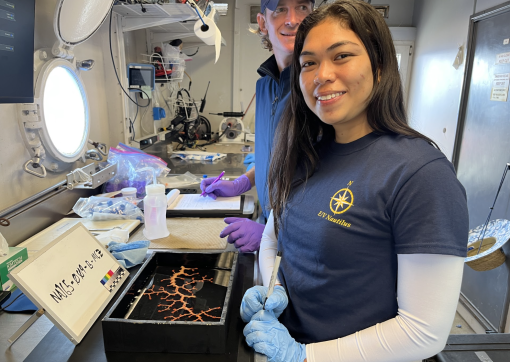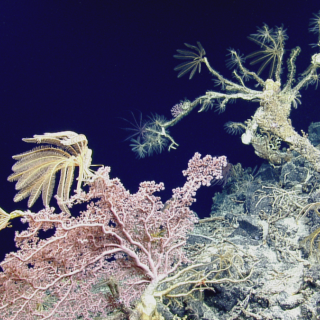Meet Ocean Explorer Erica Jonette Leon Guerrero

OET proudly welcomes Erica Jonette Leon Guerrero to the Corps of Exploration as part of the Science & Engineering Internship Program. This internship program supports community college, undergraduate, and graduate students in building professional workforce experience and exploring STEAM-related careers that connect to research themes like robotics, ocean science, education, and exploration. Erica is joining E/V Nautilus for our NA165 expedition as an Ocean Science intern.
We sat with her to learn more about this experience at sea and the path that led her to Nautilus.
Describe your role with OET.
As an Ocean Science intern on E/V Nautilus, I work alongside the science team. During ROV dives, I serve as a Data Logger noting down all important observations, samples, and actively participate in group discussions. After ROV dives, I work in both the wet lab and data lab retrieving samples from the vehicle, making scientific observations, and preserving physical samples as well as creating post dive reports and filing photos of all the samples collected on a dive.
Can you tell us a little about your background? What influenced you as a child?
I was born and raised on the island of Saipan, Northern Mariana Islands. Coming from a small island in the Pacific Ocean, I owe my love, passion, and respect for the ocean to my cultural heritage and geographical roots.
As a child, I’ve always loved spending my time wandering deep in the jungles or at the beach and coastlines trying to spot critters in the water. Seeing the same things never stopped me from going back and wanting to see more. I also, until this day, love watching documentaries on marine mammals.
When you were a kid, what did you want to be when you grew up?
When I was a kid, I wanted to be a veterinarian. I love animals and always knew I wanted to work with them. As I was introduced to the ocean and diving, my interests shifted, and I became certain that marine science was the path I wanted to take.
What would you consider to be your greatest challenge entering this field?
The greatest challenge entering this field has to be opportunity, especially where I’m from. Coming from such a small island where opportunity is minimal in terms of available organizations and agencies, experience is a bit far from hands reach. On top of that is the confidence to actually go out and pursue big opportunities. A great example of that is interning with E/V Nautilus. I would be lying if I said I didn’t have to sit myself down, tell myself I deserved it and could do it, and turn in an application.
Do you have any advice for someone looking to follow a similar path?
It’s not easy, but it’s also not impossible. It comes with a whole lot of believing in yourself, knowing what you want, and where you’d love to see yourself. Be open to every and all opportunities, you never know how far it could take you.
I am proud to be a Pacific Islander woman in STEM, and I hope that many other women like me believe that they too belong in this field and the obstacles we may see are just illusions we can get past with a better mind-set.
What's next for your ocean studies and career?
After this expedition, which hopefully is the start of many expeditions and opportunities in the future, I hope to continue my studies and enter graduate school. My dream of becoming a Marine Biologist hasn’t ended, I feel as if it had just begun!

E Mamana Ou Gataifale II - American Samoa
American Samoa is the southernmost U.S. territory, centered in the South Pacific, 2,300 miles southwest of Hawaiʻi, and 1,500 miles northeast of New Zealand. It is home to the cradle of Polynesia’s oldest culture.



